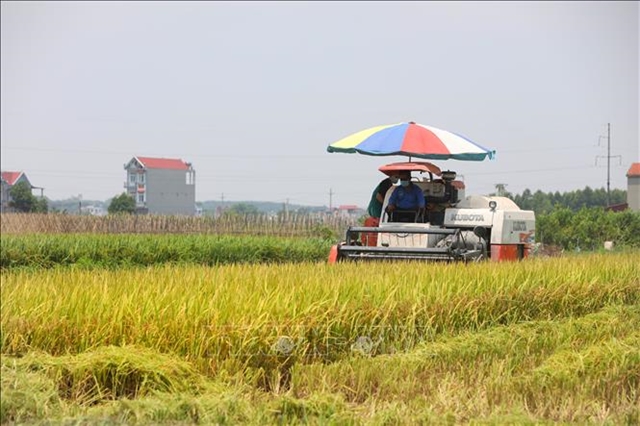 Society
Society


|
| Farmers in Bắc Giang Province's Lục Nam District harvest rice. — VNA/VNS Photo |
HÀ NỘI — The COVID-19 pandemic has caused the world unpredictable challenges, and the agriculture sector has not been spared, Deputy Minister of Agriculture and Rural Development Lê Quốc Doanh said.
He made the remarks at the first National Food Systems Summit Dialogue held by the Ministry of Agriculture and Rural Development (MARD), in partnership with a number of ministries, the UN in Việt Nam and international development partners held earlier this week in Hà Nội.
Themed 'Việt Nam Food Systems: Transparency, Responsibility, Sustainability', the dialogue is the first of a series of events to prepare the nation for its attendance in the UN Food Systems Summit (UNFSS) in September 2021.
Speaking at the meeting, he said global supply chains are disrupted, food production is severely affected and rural people, particularly the poor and vulnerable groups, are struggling to make ends meet.
Agriculture resources are degrading under the increasingly adverse impact of climate change, posing major challenges to ensuring food and nutrition security all over the world, Doanh said.
In Việt Nam, agriculture plays a significant role in maintaining food security, social stability and livelihoods for more than 60 per cent of rural population and contributes 14.85 per cent to the country’s GDP.
As the Government is making every endeavour to realise the twin goals of combating COVID-19 and sustaining socio-economic growth, agriculture has become more important in the “new normal”, economically, socially and environmentally.
The food system framework offers Việt Nam multi-sectoral, multi-tier approaches and stays in line with the country’s policies reflected in the Agriculture Restructure Plan for 2021-25, the National Target Programme on Sustainable Poverty Reduction and Social Security for 2021 – 2025, the One Commune One Product (OCOP) programme, the National Action Plan on Zero Hunger by 2025 and the National Nutrition Strategy, among others, he said.
Việt Nam will better and more effectively implement action plans in poverty eradication, food security and nutrition in rural areas, especially where ethnic minority groups and vulnerable people live, the deputy minister noted.
Đào Thế Anh, vice director of Việt Nam Academy of Agriculture Science, said Việt Nam’s agriculture had been developing quite stably both in terms of production and exports.
During the COVID-19 pandemic, its exports of farming products still saw good growth, he added.
However, some aspects of its food system had failed to achieve sustainability, for example, the high malnutrition rate in some northern mountainous provinces or Central Highland provinces, chemical abuse, soil degradation, water pollution, and degradation in forest resources and biodiversification.
A sustainable food system will not only help end poverty, but also help the world make significant progress on the United Nations 2030 Agenda, according to Rana Flowers, FAO Representative in Việt Nam.
The dialogue will empower countries to create a more comprehensive and healthy food system, protect people's health and contribute to economic development.
She said Việt Nam needs to take actions to promote co-operation and effectively use its resources to ensure food security, nutrition and food safety, not only for the nearly 100 million Vietnamese people but also to become a transparent, responsible and sustainable food supplier for the world.
The dialogue focused discussions on two main issues, namely the current state and problems of Việt Nam’s food systems; and opportunities, solutions and actions to transform food systems towards transparency, responsibility and sustainability by 2030.
The UNFSS 2021 aims to define orientations for sustainable, inclusive and resilient food systems, creating multi-dimensional impacts to deliver progress on the 2030 Sustainable Development Goals (SDG). — VNS